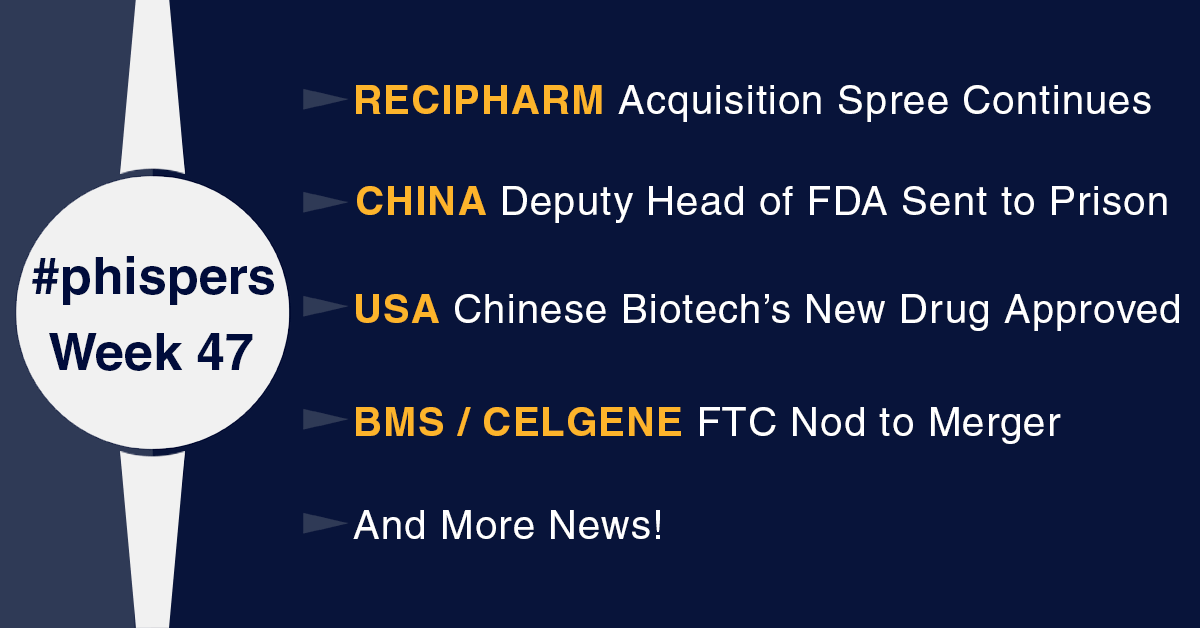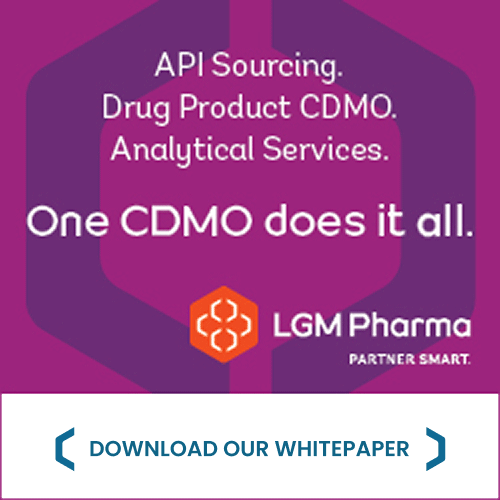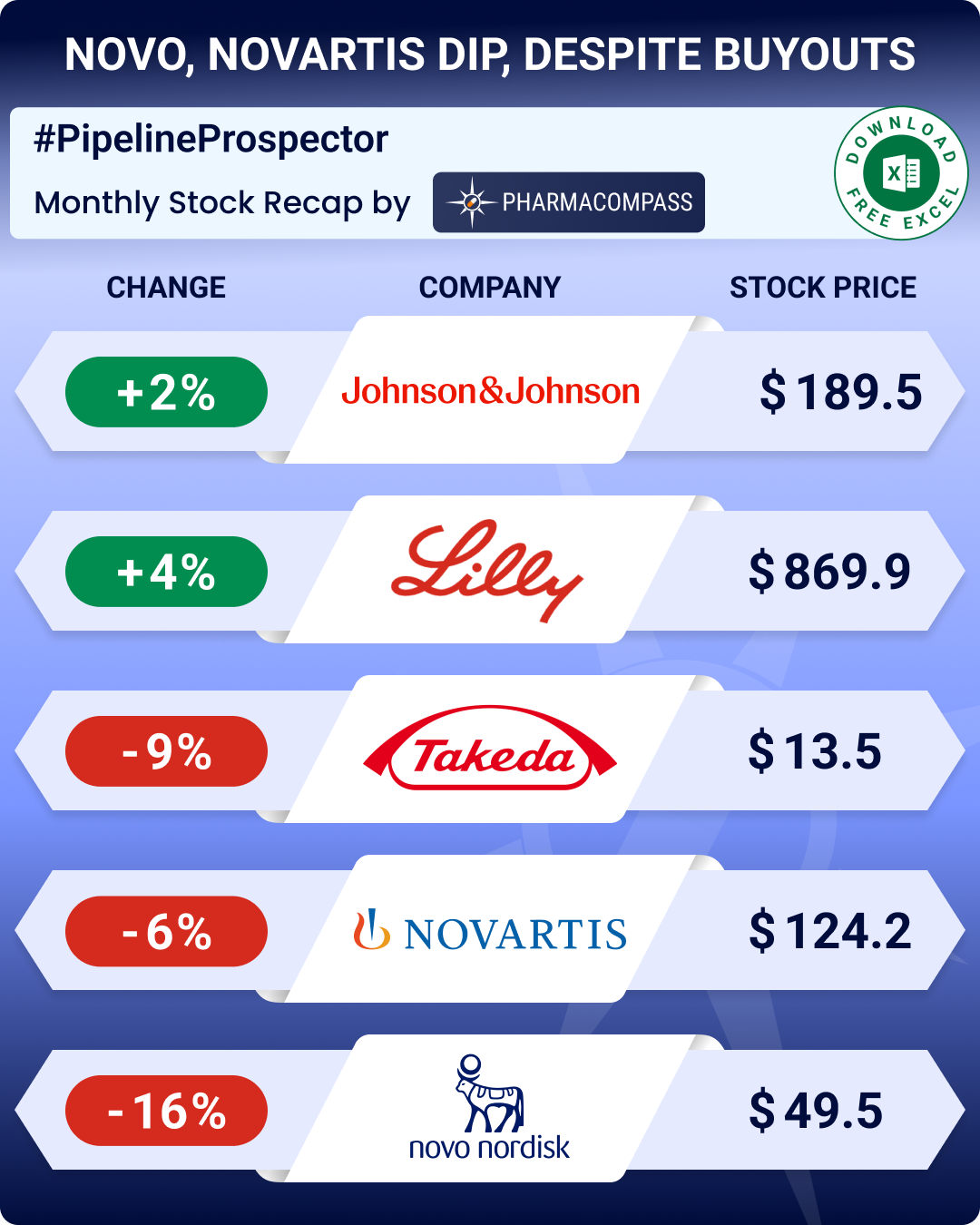
By PharmaCompass
2019-11-21
Impressions: 3968
In Phispers this week, we bring you news about US retailer Greenbrier International being issued an FDA warning letter for sourcing drugs from Chinese CMOs that were amongst the worst FDA rule offenders.
In a first, the US drug regulator approved a new drug for a rare blood cancer made by China’s BeiGene.
The US$ 74 billion BMS-Celgene merger received FTC nod.
Swedish drug group Recipharm said it will buy out Consort Medical for US$ 655 million.
And China’s former deputy head of drugs was sentenced to 16 years in prison for abuse of power and for taking bribes.
Chinese plant
littered with rodent feces supplied OTC products to US
The US Food and Drug Administration (FDA) has issued a warning letter to Virginia-headquartered Greenbrier International for using contract manufacturing organizations (CMOs) with poor GMP (good manufacturing practices) records to make over-the-counter (OTC) products.
The FDA spent a week going through records at the headquarters of Greenbrier International, owner of the nearly 16,000 Dollar Tree and Family Dollar stores. Dollar Tree runs a vast network of stores that sell OTC medicines, and serves mostly low-income communities. It generated US$ 22.8 billion in sales last year.
Firms inspected by FDA included CMOs that used to manufacture Dollar Tree’s Assured Brand drugs. The agency found that Greenbrier has used some of the worst FDA rule offenders to make Dollar Tree’s Assured Brand drugs.
After 10 months of back-and-forth about the findings, the FDA slapped Greenbrier a warning letter and has demanded that the company develop a plan to solve the problems once and for all.
In the warning letter (dated November 6), the FDA noted that the retailer purchased medicines from foreign companies that displayed a pattern of serious violations. These included a failure to test raw materials and finished products, and falsifying test results and releasing sub-potent drugs to the US market. One company had rodent feces throughout its facility, the warning letter posted on the FDA website said.
Even after the FDA notified Greenbrier that these Chinese CMOs and suppliers had received warning letters, and their products had been banned from the US, some of these products still made to the shelves of Dollar Tree. The FDA says the problems occurred repeatedly between 2016 and 2019.
“The importation and distribution of drugs and other products from manufacturers that violate federal law is unacceptable,” Donald D. Ashley, director of the Office of Compliance in the FDA’s Center for Drug Evaluation and Research said in a release about the actions. “In this case, Dollar Tree has the ultimate responsibility to ensure that it does not sell potentially unsafe drugs and other FDA-regulated products to Americans.”
The company in a statement said it already has protections to ensure its products are safe.
A spokesman for Greenbrier said: “We are committed to our customers’ safety and have very robust and rigorous testing programs in place to ensure our third-party manufacturers’ products are safe.” He added the items referenced in the FDA’s letter are topical, and not ingestible, products.
Sweden’s Recipharm buys out Consort Medical for GBP 505 million
Swedish pharmaceutical group Recipharm is buying British drug delivery device company Consort Medical for US$ 653 million (GBP 505 million).
Recipharm is a leading contract development and manufacturing organization (CDMO) in the pharmaceutical industry employing almost 7,000 employees. It has 20 facilities in 10 different countries. Consort Medical is also a CDMO, providing advanced delivery technologies, formulation and manufacturing solutions for drugs.
The board of Consort Medical had unanimously recommended the cash offer, which represented a premium of 39.1 percent to Consort Medical’s closing price on Friday of 726 pence (US$ 0.94).
Recipharm said it expects to close the deal in the first quarter of 2020. “The combination of Recipharm and Consort is highly complementary given that both organizations provide different products and services within the same value chain for a number of customers,” Recipharm said.
In recent years, there has been a lot of consolidation in the contract services market. CDMOs are acquiring competitors or complementary companies in order to fulfill demand for more services. And Recipharm is no exception. In 2016, Recipharm had acquired Kemwell’s pharmaceutical business located in Bengaluru (India). In 2017, it had entered into a long-term manufacturing agreement to supply Roche with a number of solid dose products. Under this agreement, Recipharm also acquired a manufacturing facility in Leganés (Spain), from Roche. In 2018, it had also entered into a transaction with Sanofi to acquire an inhalation business in Holmes Chapel (UK) in 2018.
Former deputy
head of China FDA sentenced to 16 years in prison
Wu Zhen, former deputy head of the now-defunct China’s food and drug regulator (which was known as China Food and Drug Administration), was sentenced to 16 years in prison by a Chinese court. He was convicted of taking bribes and abuse of power.
The ruling was handed down by a court in Chengdu. The court heard that between 1996 and 2018, Wu took advantage of his various positions to assist organizations and individuals in getting approval for drugs or finding employment. In return, he illegally accepted money and goods worth about US$ 3.1 million (21.71 million yuan) directly or through his relatives.
Wu has been under investigation since the safety scandal at vaccine maker Changsheng Biotechnology broke out. In October last year, China had slapped a US$ 1.3 billion fine on Changchun Changsheng Biotechnology Company for falsifying data of a rabies vaccine and manufacturing an ineffective vaccine for babies that had sparked widespread consumer anger.
According to the verdict, Wu was also fined to the tune of 1 million yuan (US$ 142,377.60) and had his illegal properties confiscated.
Wu received a lesser punishment as his attempts to take bribes worth 12 million yuan (US$ 1.7 million) were unsuccessful. He had also made a confession about his criminal acts before investigators uncovered them, and had expressed remorse. Wu had also returned part of the bribes he had taken.
FDA approves new
drug for rare blood cancer made by China’s BeiGene
In a first, the FDA has approved the use of a cancer therapy developed by a Chinese biotech. The Beijing-based company BeiGene secured its first-ever FDA approval for zanubrutinib (branded as Brukinsa) months ahead of schedule.
Brukinsa secured accelerated approval for adult patients with mantle cell lymphoma (MCL) — a typically aggressive, rare, form of blood cancer — who have received at least one other medicine.
The disease mostly affects men above the age of 60 years. According to the company’s estimates, between 3,000 and 4,000 new patients in the US were diagnosed with the disease in 2015.
Incidentally, last month Amgen Inc had bought a 20.5 percent stake in BeiGene to expand its presence in the world’s most populous country. Amgen had bought the stake for US$ 2.7 billion.
From a business perspective, it’s big news for BeiGene, which has priced Brukinsa at US$ 12,935 for a 30-day supply. Brokerage Cowen & Co expects peak global sales of Brukinsa to be US$ 836 million across all indications, and US$ 90 million in MCL.
BeiGene’s new treatment will compete with Johnson & Johnson and AbbVie Inc’s Imbruvica and AstraZeneca’s Calquence, as well as Celgene’s Revlimid.
The company tested Brukinsa in 118 patients with MCL enrolled in two studies. About three-quarters were Asian, 21 percent Caucasian, and between 10 and 15 percent were from the United States, BeiGene said.
By avoiding large US trials, drugmakers are more likely to quickly enroll patients in their studies, particularly for rare diseases like MCL where companies must compete with rivals testing their novel drugs in the same group of patients.
“The FDA has assessed our data and they believe that the response rates are applicable to all ethnic groups, and is representative of a population that would be treated in the US,” Jane Huang, chief medical officer for hematology at BeiGene, told Reuters ahead of the decision. “We are now incorporating China patients into global clinical trials in a greater proportion, and this is a strategy for us to be able to get our drugs to people around the world as quickly as possible.”
BMS-Celgene’s US$ 74 billion merger gets FTC nod;
Celgene to sell-off psoriasis drug
Bristol-Myers Squibb (BMS) and Celgene Corp have won US antitrust approval for their merger on the condition that they will sell Celgene’s psoriasis drug Otezla, the Federal Trade Commission said in a statement on Friday.
Meanwhile, Amgen had agreed to buy Celgene’s Otezla business with the sale valued at US$ 13.4 billion. The divestiture is the largest that the FTC or the US Department of Justice have ever required in a merger enforcement matter, the FTC said in its statement.
The vote among the five FTC commissioners was split along party lines, with the three Republicans voting to clear the way. The two Democrats, on the other hand, steamed over what they see as a major M&A move that will lessen competition and innovation.
Rebecca Slaughter, who voted to oppose the deal, argued that the FTC’s approach of demanding divestitures only if the two companies sell treatments for the same ailment was “too narrow.”
“The commission should more broadly consider whether any pharmaceutical merger is likely to exacerbate anticompetitive conduct by the merged firm or to hinder innovation,” she said in a dissenting statement.
BMS said the FTC nod meant it had all the needed regulatory approvals and would close the acquisition this week.
BMS announced in January it would buy Celgene Corp in a cash-and-stock deal for about US$ 74 billion, combining two of the world's largest cancer drug businesses in the biggest pharmaceutical deal ever.
The PharmaCompass Newsletter – Sign Up, Stay Ahead
Feedback, help us to improve. Click here
Image Credit : #Phisper Infographic by SCORR MARKETING & PharmaCompass is licensed under CC BY 2.0
“ The article is based on the information available in public and which the author believes to be true. The author is not disseminating any information, which the author believes or knows, is confidential or in conflict with the privacy of any person. The views expressed or information supplied through this article is mere opinion and observation of the author. The author does not intend to defame, insult or, cause loss or damage to anyone, in any manner, through this article.”








